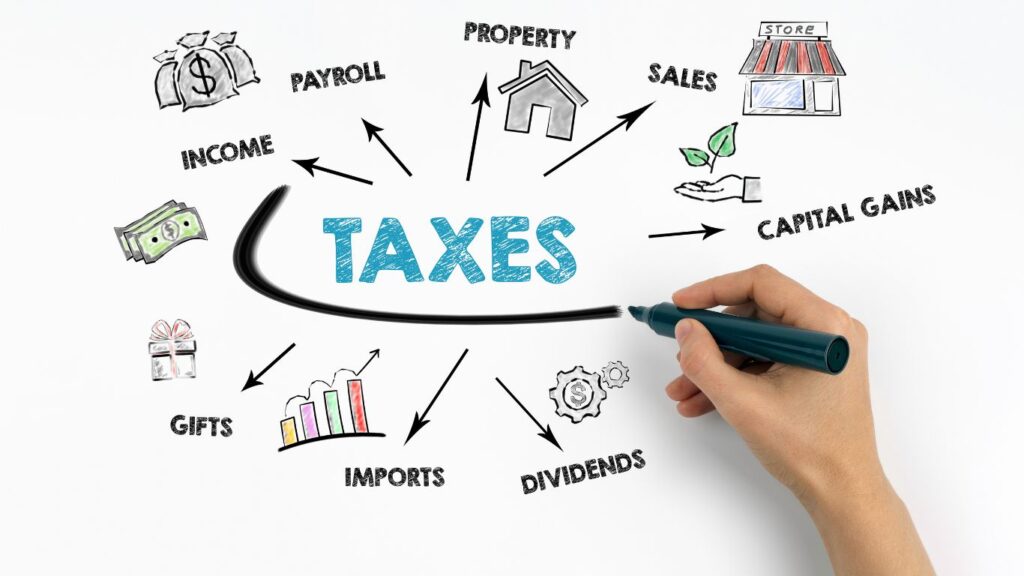Tax planning is the strategic process of minimizing tax liabilities while maximizing financial outcomes. It plays a pivotal role in personal and business finance, ensuring efficient use of resources and compliance with tax regulations. Effective tax planning empowers individuals and businesses to optimize their financial well-being, fostering economic growth and stability.
Prepare to unlock the secrets of tax planning strategies and mastery and embark on a path to financial success and career advancement. Whether you’re an entrepreneur, a financial advisor, or simply an individual eager to secure your financial future, the insights shared here will empower you to make informed decisions and navigate the tax landscape with confidence.
Chapter 1: The Basics of Tax Planning

Tax planning is the foundation of financial success for professionals. It involves understanding the tax code, identifying opportunities for savings, and strategically managing your financial affairs to optimize your tax situation. In this chapter, we’ll cover the fundamentals of the federal tax payment plan, its relevance to career growth, and key terminology you should be familiar with.
Why Tax Planning Matters for Career Growth
Tax planning is often seen as a tool for managing your financial present, but its impact on your career’s future is equally significant. Here’s how tax planning can contribute to your career growth:
Increased Savings for Skill Development: By reducing your tax liability, you free up resources that can be invested in courses, workshops, and certifications. Acquiring new skills and knowledge can make you more valuable in your current role or open doors to better-paying opportunities.
Funding Career Transitions: Tax-efficient financial planning can provide a safety net when you decide to switch careers. It can fund periods of reduced income during transitions or education to enter a new field.
Entrepreneurial Pursuits: Many professionals dream of starting their businesses. A payment plan for taxes can help you save money to invest in your entrepreneurial ventures, increasing your chances of success.
Retirement Planning: Your career growth doesn’t end with retirement. An effective payment plan to pay taxes can ensure that you retire with substantial savings, allowing you to enjoy a comfortable post-career life.
Key Terminology in Tax Planning
Let’s continue exploring essential terms in a tax plan:
Tax Withholding: This is the amount of tax taken out of your paycheck by your employer. Understanding how withholding works can help you manage your cash flow throughout the year.
Tax-Advantaged Accounts: These are financial accounts with special tax benefits. Examples include 401(k)s, IRAs, and Health Savings Accounts (HSAs). Using these accounts wisely can lead to significant tax savings.
Tax Credits: Tax credits can be refundable or non-refundable. Refundable credits can result in a tax refund if they exceed your tax liability. Understanding the types of credits available can help you maximize savings.
Chapter 2: Tax-Efficient Investment Strategies

Investing wisely is a cornerstone of payment plans for taxes mastery. By understanding the tax implications of different investment choices, you can maximize returns and bolster your career’s financial foundation.
Investing for Long-Term Tax Benefits
One of the key strategies in tax-efficient investing is to focus on long-term gains. The tax code offers preferential treatment for investments held for extended periods. Here’s how it works:
Capital Gains Tax: When you sell an investment for a profit, you’ll typically incur capital gains tax. However, if you hold the investment for over a year, you may qualify for a lower long-term capital gains tax rate. This can significantly reduce your tax liability.
Dividend Taxation: Dividends from investments are also taxed at different rates. Qualified dividends, which come from certain types of stocks held for a specific duration, may be subject to lower tax rates.
Tax-Advantaged Accounts: 401(k), IRA, and More
Utilizing tax-advantaged accounts is a powerful way to grow your wealth while minimizing taxes:
401(k): If your employer offers a 401(k) plan, contribute as much as possible, especially if they match contributions. Contributions are typically pre-tax, reducing your current taxable income.
Individual Retirement Account (IRA): IRAs come in two primary forms – Traditional and Roth. Contributions to a Traditional IRA may be tax-deductible, reducing your current tax burden. Roth IRAs offer tax-free withdrawals in retirement.
Health Savings Account (HSA): If you have a high-deductible health plan, consider an HSA. Contributions are tax-deductible, and withdrawals for qualified medical expenses are tax-free.
Diversification and Tax Efficiency
Diversifying your investment portfolio can enhance tax efficiency. By holding a mix of assets with varying tax characteristics, you can potentially reduce your overall tax liability.
Tax-Efficient Fund Placement: Consider placing investments with high expected returns but lower tax efficiency, like actively managed funds, in tax-advantaged accounts. Put tax-efficient investments like index funds in taxable accounts.
Tax-Loss Harvesting: Offset capital gains by selling investments with losses. These losses can be used to reduce your taxable gains.
Charitable Giving with Appreciated Assets: Donating appreciated assets, such as stocks, can provide tax benefits. You can avoid capital gains tax while supporting a cause you believe in.
Chapter 3: Leveraging Tax Deductions and Credits

Tax deductions and credits are powerful tools that can help you lower your overall tax liability, freeing up funds for career development and growth.
Identifying Tax Deductions for Professionals
As a professional, there are various tax deductions available to you:
Business Expenses: Deducting business-related expenses is crucial for reducing your taxable income. These expenses can include office supplies, professional memberships, travel costs, and more. Small business tax planning may differ from larger companies.
Home Office Deduction: If you work from home, you may be eligible for the home office deduction. This allows you to deduct a portion of your home-related expenses, such as rent or mortgage interest, utilities, and maintenance. Tax and estate planning is life-saving!
Education Expenses: If you invest in continuing education or professional development courses related to your career, you may be able to deduct these expenses.
Maximizing Business Expenses
When it comes to business expenses, thorough record-keeping is essential:
Receipts and Documentation: Keep detailed records of all expenses related to your profession. This includes receipts, invoices, and other supporting documents. Whether it’s a small business tax plan or a larger one.
Expense Tracking Tools: Consider using expense tracking software or apps to simplify the process. These tools can help you categorize expenses and generate reports for tax purposes.
Utilizing Tax Credits to Your Advantage
Tax credits provide a direct reduction in your tax liability and can have a significant impact on your finances:
Child and Dependent Care Credit: If you have dependents and incur childcare expenses, you may be eligible for this credit, which can help offset the cost of care while you work.
Lifetime Learning Credit: This credit can be claimed for eligible education expenses incurred during your pursuit of higher education or professional development.
Earned Income Tax Credit (EITC): Depending on your income and family size, the EITC can provide a substantial credit, boosting your overall financial well-being.
Chapter 4: Real Estate and Payment Plan For Taxes

Real estate can play a significant role in both your financial portfolio and tax planning strategy. Understanding the tax implications of real estate investments can help you make informed decisions and advance your career.
Owning vs. Renting: Tax Considerations
One of the fundamental decisions in real estate is whether to own or rent your place of residence. Here are some key taxes payment plan considerations:
Mortgage Interest Deduction: Homeowners can often deduct mortgage interest, reducing their taxable income. This deduction can provide significant savings over time.
Property Taxes: Property taxes are deductible for homeowners. Renters do not have this deduction.
Rent Expenses: While renters don’t get the same deductions as homeowners, they also don’t have the responsibilities of property maintenance and repairs.
Tax Implications of Real Estate Investments
If you’re considering real estate as an investment opportunity, it’s important to be aware of the tax implications:
Capital Gains: When you sell a real estate investment for a profit, you may incur capital gains tax. However, there are strategies like 1031 exchanges that can defer or reduce this tax.
Rental Income: If you’re earning rental income, it’s generally taxable. However, you can deduct various expenses associated with the property.
Real Estate Depreciation: Real estate investors can also benefit from depreciation deductions, which can offset rental income.
Homeownership Tax Benefits
Homeownership offers specific tax advantages that can support your career:
First-Time Homebuyer Credits: Depending on your location and circumstances, you may qualify for first-time homebuyer credits, providing financial support as you establish your career.
Home Office Deduction: For self-employed professionals, the home office deduction can be particularly advantageous when you own your residence.
Chapter 5: Advanced Tax Planning Strategies

In this chapter, we’ll explore advanced payment plan taxes techniques that can further enhance your career’s financial potential.
Tax-Efficient Gifting and Inheritance
As your career progresses, you may want to consider tax-efficient strategies for wealth transfer:
Gift Tax Exclusion: Understanding the annual gift tax exclusion limit and lifetime gift tax exemption can help you plan for tax-efficient wealth transfers to loved ones.
Estate Planning: Developing a comprehensive estate plan can ensure your assets are distributed according to your wishes while minimizing estate taxes.
Tax Payment Plan for Self-Employed Professionals
Self-employed professionals have unique tax considerations:
Business Structure: Choosing the right business structure can impact your tax liability. Options like sole proprietorships, LLCs, S corporations, and C corporations each have distinct tax implications.
Quarterly Estimated Taxes: Self-employed individuals often need to make quarterly estimated tax payments to avoid penalties and ensure proper tax planning.
International Tax Considerations
If your career takes you beyond your home country’s borders, international tax planning becomes essential:
Foreign Earned Income Exclusion: Understanding this exclusion can help you minimize U.S. taxation on income earned abroad.
Tax Treaties: Be aware of tax treaties between your home country and the country where you work. These treaties can impact your tax obligations.
Chapter 6: Staying Compliant and Ethical

Ethical tax planning is not just about following the law; it’s also about upholding moral and social responsibilities. This chapter explores the importance of staying compliant and ethical in your tax planning efforts.
Tax Compliance and Legal Obligations
Staying compliant with tax laws and regulations is an absolute necessity for anyone looking to build a successful career. Tax laws are dynamic, subject to frequent changes, and can be complex. Here’s why compliance is crucial:
Avoiding Penalties: Failure to comply with tax laws can result in severe penalties. These penalties can quickly erode your financial resources and hinder your career progress.
Preserving Reputation: A tarnished reputation can be a significant setback in any profession. Non-compliance can damage your professional standing, making it difficult to secure clients, and partners, or even maintain your current job.
Legal Consequences: Beyond financial penalties, non-compliance can lead to legal trouble. Legal battles can be time-consuming, and costly, and can seriously impede your career advancement.
To ensure compliance, stay informed about tax law changes relevant to your situation, keep detailed records, and consider consulting with a tax professional who can provide guidance tailored to your needs.
The Ethical Aspect of Tax Planning
Ethical tax planning goes beyond mere compliance; it involves considering the broader moral and social responsibilities associated with managing your finances. Here’s why ethics matter in tax planning:
Social Responsibility: As a professional, you have a responsibility to contribute to the well-being of society. Paying your fair share of taxes supports essential public services like education, healthcare, and infrastructure.
Reputation and Trust: Ethical behavior enhances your professional reputation and builds trust with colleagues, clients, and the community. People prefer to work with and hire professionals they can trust.
Long-Term Success: Ethics and integrity are often tied to long-term success. Ethical professionals tend to establish enduring careers and businesses.
Ethical tax planning involves making principled financial decisions that align with both the letter and spirit of the law. It means paying the taxes you owe while optimizing your financial situation within the bounds of legality.
Consequences of Tax Evasion
Tax evasion, the deliberate act of not paying taxes owed, is a serious offense with severe consequences. Understanding these consequences can deter individuals from engaging in unethical practices:
Legal Ramifications: Tax evasion is a criminal offense. Individuals found guilty of tax evasion can face fines, imprisonment, or both. A criminal record can have a lasting negative impact on your career prospects.
Financial Penalties: In addition to potential jail time, tax evaders are required to pay back taxes owed plus interest and penalties. These financial penalties can be financially devastating.
Professional and Personal Damage: Tax evasion can damage your professional reputation, making it difficult to secure employment or clients. It can also strain personal relationships.
The risks associated with tax evasion far outweigh any potential short-term gains. It’s essential to approach tax planning with integrity, transparency, and a commitment to meeting your legal and ethical obligations.
Chapter 7: Hiring Tax Professionals and Financial Experts

As your financial situation becomes more complex, collaborating with tax professionals becomes increasingly important. In this chapter, we explore the factors involved in hiring tax advisors.
When to Consider Hiring a Tax Advisor
Knowing when to seek professional tax advice can prevent costly mistakes and ensure that you’re making the most of available opportunities. Consider hiring a tax advisor:
When Your Situation Changes: Major life events such as marriage, divorce, starting a business, or receiving a significant windfall can dramatically impact your tax situation. Consulting a tax advisor during these times can help you navigate the complexities.
When Dealing with Complex Investments: If you have diverse investments, especially in real estate or international assets, a tax advisor can help you optimize your portfolio’s tax efficiency.
When Facing IRS Issues: If you’re audited by the IRS or have unresolved tax issues, it’s wise to enlist professional assistance. Tax advisors can represent you, negotiate with the IRS, and help resolve disputes.
Annually for Comprehensive Planning: Many individuals and businesses benefit from annual consultations with tax advisors. This proactive approach ensures that you’re making the most of available deductions, credits, and tax-saving opportunities.
Choosing the Right Tax Professional
Selecting the right tax advisor is a critical decision. The options include Certified Public Accountants (CPAs), tax attorneys, and Enrolled Agents (EAs). Here’s what to consider:
Credentials: Verify that the tax professional holds the necessary credentials and licenses. CPAs, tax attorneys, and EAs have specific qualifications and expertise.
Experience: Look for a tax advisor with experience in your specific tax situation. Someone familiar with your profession or industry can provide more tailored advice.
Reputation: Seek referrals and check reviews or testimonials. A reputable tax professional should have a track record of delivering reliable and ethical service.
Working Collaboratively with Tax Experts
Building a collaborative relationship with tax professionals can lead to more effective tax planning. Here’s how to make the most of this partnership:
Open Communication: Share all relevant financial information with your tax advisor. Transparency is essential for accurate and effective tax planning.
Proactive Planning: Work with your tax advisor to proactively plan for the year ahead. Early planning can help you take advantage of tax-saving opportunities.
Stay Informed: Even with a tax advisor, it’s important to stay informed about your tax situation. Ask questions, seek explanations, and actively participate in the planning process.
In conclusion, hiring a tax advisor can be a strategic move in your career journey. They can help you navigate the complexities of the tax code, ensure compliance, and optimize your tax situation for maximum financial benefit.
Conclusion
In this comprehensive guide, we’ve explored the world of tax planning mastery and its potential to advance your career. From understanding the basics of tax planning to leveraging deductions, credits, and real estate investments, you now have the knowledge to make informed financial decisions that can propel your career forward. Advanced strategies, ethical considerations, and the importance of collaborating with tax professionals round out your toolkit for career-enhancing tax planning.
Remember that the key to success in tax planning is ongoing education and adaptability. Tax laws change, and your financial situation evolves. By staying informed and proactive, you can continue to maximize returns and achieve your career aspirations.
If you need an expert opinion on your taxes or you want to find a suitable job to keep your finances on track go to BC Jobs. From legal jobs to retail jobs, depending on your requirements, you can enhance your financial health!
Tags: Tax Planning Mastery



